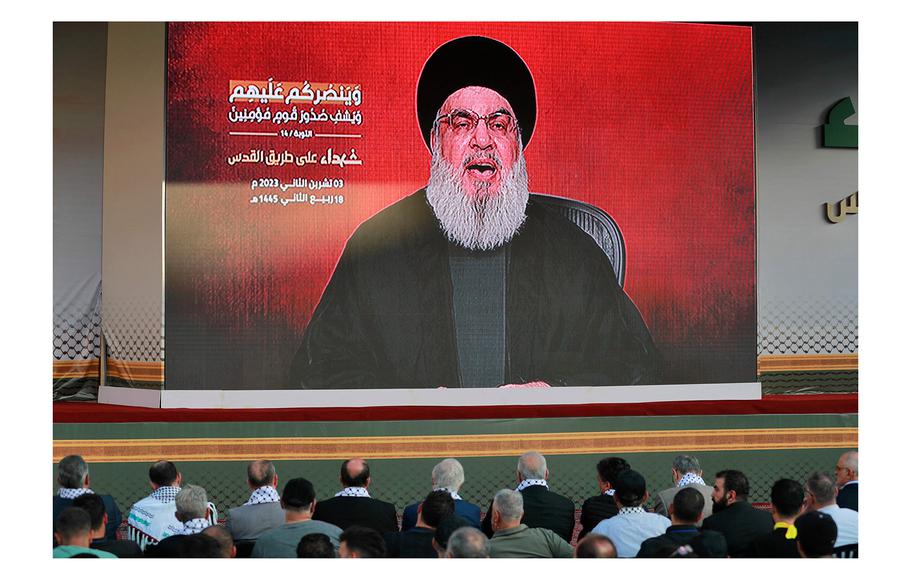
Supporters of the Lebanese Shiite movement Hezbollah watch a televised speech by its leader, Hassan Nasrallah, in the Lebanese capital Beirut's southern suburbs on Friday, Nov. 3, 2023. (Ahmad Al-Rubaye/AFP/Getty Images/TNS)
(Tribune News Service) — Hezbollah’s leader issued a warning to Israel that the Lebanon-based militant group is ready for “all possibilities,” suggesting the daily cross-border fire between the two could tip into a full-blown war.
Speaking of the Hamas assault on Israel — in which 1,400 people, mostly civilians, were killed — Hezbollah Secretary General Hassan Nasrallah described “a new phase of fighting against this enemy.” Both Hamas and Hezbollah are backed by Iran and designated as terrorist organizations by the U.S.
In his first speech since the Oct. 7 attacks, he said the escalating conflict on the Lebanese border would depend on developments in Gaza — where Hamas is based — and Israel’s “behavior toward Lebanon.”
“I will be transparent and honest and purposely ambiguous to say that all possibilities are open on our Lebanese front,” Nasrallah said. “We have to be ready and present for all future probabilities.”
Both Israel and Hezbollah have said the cross-border fire was mainly within the so-called rules of engagement, which limits the battle to Lebanese areas Hezbollah considers occupied.
Read More: Why Hezbollah Is a Wild Card in New Mideast Fighting: QuickTake
Nasrallah said the group entered the battle against Israel a day after Hamas’ initial attack, with Lebanese and at times Palestinian militants firing rockets from Lebanon at Israeli army posts along the border.
“Don’t try us — a mistake will cost you dearly,” Israeli Prime Minister Benjamin Netanyahu warned Hezbollah in broadcast remarks Friday. “A mistake will cost you a price you can’t even imagine.”
Gold and oil futures were volatile as investors closely watched Nasrallah’s speech for signs of immediate regional escalation with Israel. During his address, gold initially dropped from the day’s high but later rebounded as he adopted his usual assertive tone. In contrast, West Texas Intermediate crude oil slid by as much as 1.8% to about $81 a barrel, just below where it was at the start of the conflict.
“In our view, what’s happening on the border is very big from our side and very important and it won’t be enough for us anyway,” said Nasrallah, who is in hiding and rarely appears in public.
As the Israeli army steps up its ground operation in Gaza to combat Hamas, it has growing concerns about a new front opening to the north with Hezbollah. That group is already exchanging fire with Israel on a near-daily basis, leaving more than 50 Hezbollah fighters dead since Oct. 7, with five members announced killed Thursday following intense clashes.
One of the Middle East’s most powerful militias, Hezbollah has said it has 100,000 fighters and an arsenal of missiles able to reach all of Israel. Its battle-hardened fighters have in recent years seen extensive combat in Syria, where they fought alongside President Bashar al-Assad against rebel forces.
The last major war between Israel and Hezbollah in 2006 left more than 1,000 dead in Lebanon, and more than 100 in Israel, as well as triggering mass displacement and infrastructure damage. The group claimed victory back then and for a time enjoyed popular support in the Arab world.
Iran has warned that new fronts would open up against the U.S. if it continues its unequivocal support for Israel.
Thousands of supporters
In his speech, which saw thousands of supporters gather in the capital’s suburbs and elsewhere to watch, Nasrallah said the U.S. was “directly responsible” for Israeli attacks on Gaza and called on Arab and Muslim nations to sever ties with Israel.
He said they have received several “threats” that the U.S. was ready to strike the group if it intervened in the war and praised groups in Yemen and Iraq for launching attacks against Israel and U.S. interests.
“You Americans know very well, that if a war breaks out in the region, then your fleets will be useless, and your fighting from air will be useless, and the first victims will be your interests,” he said.
The Oct.7 attack was purely a Palestinian decision and execution, Nasrallah said, fending off claims that Iran and other militant groups it supports might have had a hand in the planning.
“No one knew about it,” he said.
With assistance from Kateryna Kadabashy, Thomas Hall and Nour Al Ali.
©2023 Bloomberg News.
Visit bloomberg.com
Distributed by Tribune Content Agency, LLC.